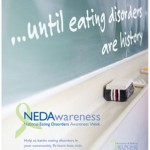 In honor of National Eating Disorder Awareness Week, we present a profile of a recent meeting of the Harris Center Teen Mentor Program, which works with adolescent girls who want to promote positive body image among their peers. Dr. Anne Fishel, an Associate Clinical Professor of Psychology at the Harvard Medical School and the author of our Food for Thought blog, spoke to the teen mentors about how family can impact an adolescent’s relationship with food.
In honor of National Eating Disorder Awareness Week, we present a profile of a recent meeting of the Harris Center Teen Mentor Program, which works with adolescent girls who want to promote positive body image among their peers. Dr. Anne Fishel, an Associate Clinical Professor of Psychology at the Harvard Medical School and the author of our Food for Thought blog, spoke to the teen mentors about how family can impact an adolescent’s relationship with food.
Talking with Dr. Fishel, the teen mentors learned about research that suggests a strong link between regular family dinners and creating a healthy body image. This led to a lively discussion about how family meals promote healthy eating habits, and positively influence how teenagers and children think about food. Teens then shared information about their current advocacy projects, which included participating in “Fat Talk Free Week.”
“Fat Talk Free Week” is a nationwide movement that calls for a week-long end to “fat talk.” According to the movement’s website, “fat talk” is defined as “all of the statements made in every day conversation that reinforce the thin-ideal standard of female beauty.” Examples of fat talk include, “I’m so fat,” “I need to lose 10 pounds,” and, “She’s too fat to be wearing those jeans.”
For Fat Talk Free Week, the teen mentors planned to ask classmates to sign pledges to stop engaging in fat talk, in order to create a more positive body acceptance culture at their school. Harkening back to their earlier conversation, the teens discussed the connection between The Family Dinner Project and their Fat Talk Free campaign. By keeping conversations at the dinner table positive and empowering, the teen mentors believed that family dinners could decrease fat talk. They pledged to hold their families accountable for fat talk, and make sure that family dinner conversations remained constructive.
“I think family dinners help prevent eating disorders by reminding us to view food and ourselves in a healthy context,” said 12th grader Katy Tucker, one of the teen mentors. “So many adolescents have a relationship with food and body image that, at best, prioritizes superficiality, and at worst, causes illnesses that destroy physical and mental health. Family dinners give young people a context where food is positive rather than loaded, while talking and connecting on a meaningful level.”
Katy went on to say that if parents consistently set a healthy body image example, young people might be less likely to view food as a means by which to define their self-worth.
“I’d never really thought about family dinners as related to my relationship with body image before,” said Katy. “After reflecting on it, I realized that the only times I don’t view food as something threatening or a source of guilt are these dinners. In my daily life, it can be difficult to feel positive about food. Family dinners provide a setting where food is not a means of controlling my body, but something to enjoy with people who don’t judge me on superficial qualities.”
Working within Massachusetts General Hospital, the Harris Center promotes eating disorder advocacy and education. The Teen Mentor Program offers adolescent girls the opportunity to learn from Harris Center staff and each other about ways to encourage positive body image and self-esteem with their peers. Under the guidance of the program’s director, teen mentors assume advocacy leadership roles, design and execute projects that will affect change in their communities, and serve as a resource for other students at their schools.
For more information on the Harris Center, please visit https://www.harriscentermgh.org.
To learn more about Fat Talk Free Week, visit the campaign website at: https://www.endfattalk.org.
